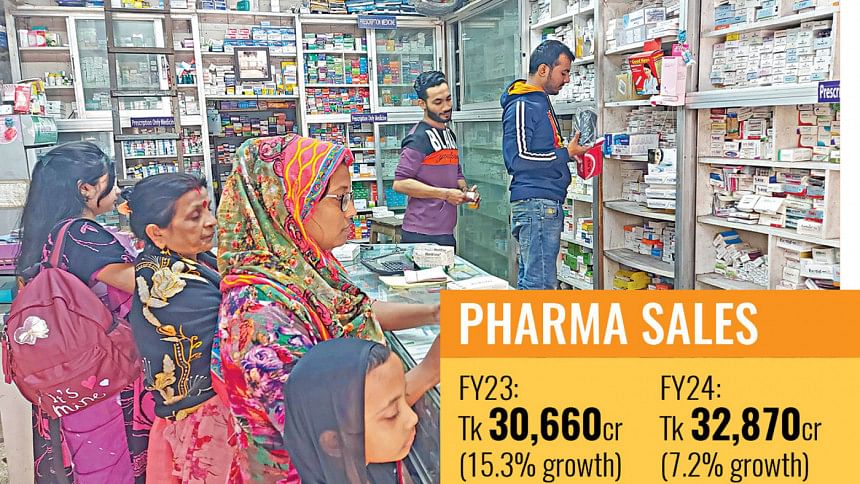Drug sales growth slows amid high inflation

Sales growth of drugs slowed down in fiscal year 2023-24 ending last June, which could be an effect of high inflationary pressure prevailing in the country over the last two years.
Meanwhile, prices of drug products of several companies have increased.
The Bangladesh pharmaceutical market recorded a moderate sales growth of 7.2 percent in the fiscal year.
It was an exceptional 15.3 percent in the preceding fiscal year.
Last fiscal year's growth rate is lower than the average of 9 percent recorded by the industry in the past four years.
The market sales amounted to Tk 32,870 crore in the year ending on June 30 this year, according to IQVIA, a leading global provider of advanced analytics, technology solutions, and clinical research services to the life sciences industry.
It was Tk 30,660 crore in the preceding fiscal year.
Sales growth of drugs dropped mainly due to a reduction in the purchasing capacity of people amid high inflation for more than two years, said Jubayer Alam, company secretary at Renata PLC.
Inflation rose to 11.38 percent in November, the highest in four months, owing to the soaring prices of food, especially the staple rice and vegetables, according to the state-run Bangladesh Bureau of Statistics.
It has remained over 9 percent since March 2023.
Due to ongoing inflationary pressure, real income reductions have pushed at least 78 lakh people into poverty, according to a study of the Research and Policy Integration for Development (RAPID).
This includes 38 lakh people who have become extremely poor.
Besides, around 1 crore more are at risk of slipping below the poverty line due to continued inflationary pressures, the private research firm said.
If people, especially lower middle income and financially insolvent people, do not feel an extreme need for medicine, they avoid going to pharmacies, said Alam.
They prioritise other basic needs, such as food, over medication, he said.
Among the different drug groups, antibiotics witnessed a 10.16 percent growth. It was 11.20 percent in the previous fiscal year.
Rising awareness of self-care has driven the growth of certain medicines that currently require prescriptions but have the potential to become over-the-counter drugs.
These include antihistamines and expectorants, which saw sales growths of 16.23 percent and 12.92 percent respectively.
A few therapeutic class drugs like proton-pump inhibitors (PPIs), calcium and vitamins saw minimum growths of 5.72 percent, 6.63 percent and 4.89 percent respectively.
PPIs represent a class of drugs most prominently known for their use in acid-related disorders.
The pharmaceutical sector usually grows at a handsome rate every year, but the growth might not be high, especially when the country's GDP growth rate is projected to fall, said MA Razzaque, chairman of the RAPID.
On the other hand, there is persistent inflationary pressure, for which people's purchasing power has dropped, he said.
So, there is a possibility that people reduced their consumption of drugs. It is true that prices of drugs rose, so people are facing difficulties to afford medicine, he added.
A top official of a listed drug company said every company could not adjust prices in spite of a rise in raw material costs due to the depreciation of the local taka against the US dollar.
Apart from raw material costs, energy costs also experienced a notable increase, driven by a 10 percent increase in electricity prices and a 2.3 percent average increase in diesel prices in FY24.
Company-wise, Square Pharmaceuticals saw a sales growth of 15 percent to reach Tk 7,010 crore while Beximco Pharmaceuticals 13 percent to Tk 4,439 crore and Renata PLC 14.4 percent to Tk 3,771 crore, according to their financial reports.
Although the growth in consolidated sales, meaning sales including those of subsidiaries, was high, standalone sales growth of the companies were comparatively low.
Regarding the industry's lower growth rate, Beximco Pharmaceuticals, in its annual report, said it reflects the broader economic challenges of the year, including persistent inflationary pressures, macroeconomic instability, and reduced GDP growth.
These factors have posed significant challenges for the pharmaceutical industry, and prolonged inflation coupled with subdued economic conditions may continue to constrain market expansion in the coming year, it added.
Bangladesh is largely self-sufficient in pharmaceuticals, producing 98 percent of the medicines needed for the domestic market.
The industry is home to around 300 companies and has grown to become one of the country's top export sectors, supplying generic medicines to over 150 countries.

 For all latest news, follow The Daily Star's Google News channel.
For all latest news, follow The Daily Star's Google News channel. 






Comments